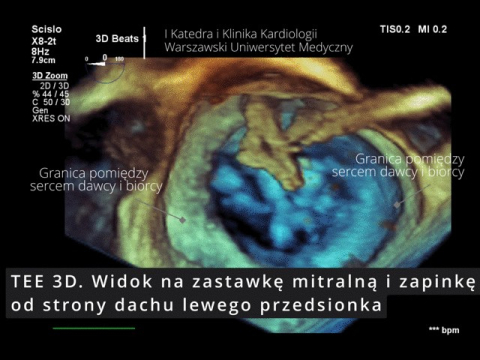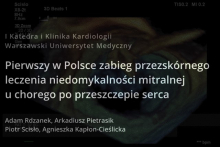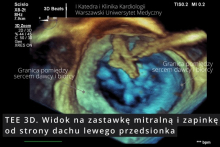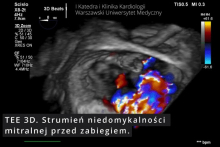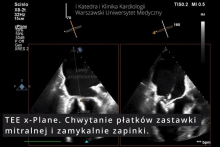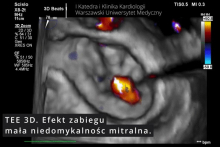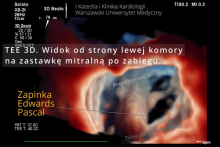The procedure was performed on a 65-year-old patient who underwent a heart transplant 24 years ago. Over the past few months, his symptoms of severe mitral regurgitation - reduced exercise tolerance caused by shortness of breath - had intensified. The cardiology and cardiac surgery consortium UCC MUW considered him a high-risk surgical patient, and he could not undergo cardiac surgery to treat the defect. Therefore, specialists decided on a procedure for percutaneous edge-to-edge treatment of severe mitral regurgitation using the Edwards Pascal system. So far, this type of procedure has not been performed in heart transplant patients in Poland.
The surgery was carried out by a team of surgeons: Adam Rdzanek, MD, PhD, Arkadiusz Pietrasik, MD, PhD, echo navigators: Piotr Scisło, MD, PhD, Agnieszka Kapłon-Cieślicka, MD, PhD, and cardiac anesthesiologist Dr. Renata Andrzejewska. The patient was cared for by a team of cardiologists led by Dr. Eulalia Welk and Anna Fojt, MD, PhD. The procedure took place at the Department of Invasive Cardiology (headed by Prof. Janusz Kochman) of the 1st Chair and Department of Cardiology of the Medical University of Warsaw (headed by Prof. Marcin Grabowski).
The procedure involves suturing, using a special clasp, both mitral valve leaflets at the site of regurgitation. The device is inserted through the femoral vein, inferior vena cava into the right atrium. Then through the fossa ovalis of the atrial septum into the left atrium over the mitral valve and further into the left ventricle. The difficulty of the procedure lies in grasping, under the guidance of transesophageal echocardiography, both constantly moving valve leaflets. The procedure requires perfect coordination of the surgeon team and echocardiographic navigation.
- The procedure, which lasted 63 minutes, reduced severe mitral regurgitation to minor. For heart transplant patients, percutaneous treatment of valve defects is an important therapeutic alternative to classical cardiac surgery techniques, says Piotr Scisło, MD, PhD. He adds: - The patient was discharged home three days after the procedure. His prognosis is good.
